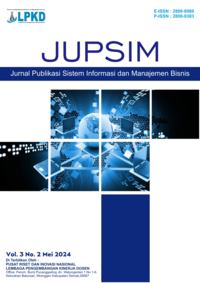Optimalisasi Artificial Intelligence untuk Promosi Produk Ekonomi Kreatif melalui Media Sosial
DOI:
https://doi.org/10.55606/jupsim.v4i2.5106Kata Kunci:
Artificial Intelligence, Creative Economy, Product Promotion, Social Media, TourismAbstrak
This study aims to analyze the use of Artificial Intelligence (AI) in promoting creative economy products in Central Java's tourist areas, particularly through social media. In today's digital era, developments in information and communication technology, including artificial intelligence, have opened up new opportunities for more efficient, personalized, and data-driven marketing strategies. Creative economy products such as batik, handicrafts, and local culinary delights can gain broader exposure through innovative digital promotional approaches. However, Micro, Small, and Medium Enterprises (MSMEs) in Central Java's tourist areas, such as Jatirejo Village in Semarang, known for its palm fruit (kolang-kaling), still face various challenges in adopting this technology. This study used a descriptive qualitative method with a case study approach. Data were collected through in-depth interviews with MSMEs, field observations, and documentation related to their digital promotional activities. The results indicate that limited human resources, lack of digital literacy, minimal understanding of the concept and application of AI, and inadequate technological infrastructure are the main obstacles in implementing AI for promoting creative economy products. However, this study also identified significant opportunities for optimizing AI implementation. These opportunities include training and mentoring for MSMEs, collaboration between the government, academia, and the private sector, and the development of equitable digital infrastructure. This study provides strategic recommendations to enhance MSME competitiveness in the digital era and strengthen synergies between technology and the creative economy. These findings are expected to serve as an important reference for policymakers and businesses in formulating adaptive and sustainable AI-based promotional strategies.
Referensi
Aji, H. K., Murdani, A. D., & Wijayati, H. (2023). The strategy in developing global competitive tourism based on creative economy and local wisdom (Case study: Solo City, Indonesia). International Journal of Business and Applied Economics, 2(5), 851–862. https://doi.org/10.55927/ijbae.v2i5.5970
Arbaiza, F., Arias, J., & Robledo-Dioses, K. (2024). AI-driven advertising activity: Perspectives from Peruvian advertisers. Communication and Society, 37(4), 273–292. https://doi.org/10.15581/003.37.4.273-292
Chintalapati, S., & Pandey, S. K. (2022). Artificial intelligence in marketing: A systematic literature review. International Journal of Market Research, 64(1), 38–68. https://doi.org/10.1177/14707853211018428
Chung, N. C. (2021). Human in the loop for machine creativity. Munro. http://arxiv.org/abs/2110.03569
Dwivedi, Y. K., Hughes, D. L., Ismagilova, E., Aarts, G., Coombs, C., Crick, T., ... & Williams, M. D. (2021). Artificial intelligence (AI): Multidisciplinary perspectives on emerging challenges, opportunities, and agenda for research, practice and policy. International Journal of Information Management, 57, 101994. https://doi.org/10.1016/j.ijinfomgt.2019.08.002
Hartono, I. B., Tjiptoherijanto, P., Chotib, C., Wulandari, S. L., & Sidiq, F. F. (2023). Potential and challenges in creative economy development in Depok City: SWOT analysis and strategic recommendations. Journal of Governance, 8(4). https://doi.org/10.31506/jog.v8i4.22338
Howkins, J. (2022). ReThinking the creative economy. Academia Letters, June, 1–4. https://doi.org/10.20935/AL5870
Indaryanto, A., Harijadi, B. D., & Sinaga, E. (2023). The growing use and impact of artificial intelligence technologies in the tourism industry. Sustainable Engineering and Innovation, 5(2), 189–204. https://doi.org/10.37868/sei.v5i2.id238
Kaplan, A. M., & Haenlein, M. (2010). Users of the world, unite! The challenges and opportunities of social media. Business Horizons, 53(1), 59–68. https://doi.org/10.1016/j.bushor.2009.09.003
Kumar, S., Kumar, V., & Attri, K. (2021). Impact of artificial intelligence and service robots in tourism and hospitality sector: Current use & future trends. Administrative Development: A Journal of HIPA, Shimla, 8(SI-1), 59–83. https://doi.org/10.53338/ADHIPA2021.V08.SI01.04
Meng, Z. (2024). The role of AI in transforming local economies: Exploring how AI technologies are impacting local businesses and labor markets. Applied and Computational Engineering, 108(1), 1–6. https://doi.org/10.54254/2755-2721/108/2025LD0053
Nugroho, Y., Siregar, M. L., & Laksmi, S. (2012). Indonesia: From online activism to digital democracy. Friedrich Ebert Stiftung.
Rahmawati, R., & Andriani, D. (2022). Pemanfaatan media sosial dalam meningkatkan pemasaran produk ekonomi kreatif di era digital. Jurnal Ekonomi dan Kewirausahaan Kreatif, 5(2), 102–112. https://doi.org/10.25077/jekk.5.2.2022
Tuomi, A. (2023). AI-generated content, creative freelance work and hospitality and tourism marketing. In Springer Proceedings in Business and Economics. Springer Nature Switzerland. https://doi.org/10.1007/978-3-031-25752-0_35
Xue, F. (2024). AI integration in creative industries: Challenges and opportunities. Applied and Computational Engineering, 104(1), 21–27. https://doi.org/10.54254/2755-2721/104/20240906
Zheng, L. (2023). Innovation in tourism marketing based on social media. Tourism Management and Technology Economy, 6(6). https://doi.org/10.23977/tmte.2023.060602
Unduhan
Diterbitkan
Cara Mengutip
Terbitan
Bagian
Lisensi
Hak Cipta (c) 2025 Jurnal Publikasi Sistem Informasi dan Manajemen Bisnis

Artikel ini berlisensiCreative Commons Attribution-ShareAlike 4.0 International License.







